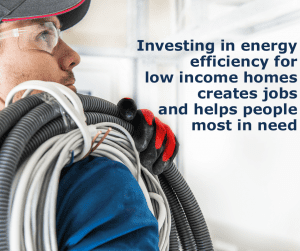50 plus organisations propose a smart housing installation boom to make a real difference
 ACOSS Media Release
ACOSS Media Release
Friday 19 June 2020
Over 50 social, property, business, environment, local councils and research groups have banded together to call on Federal and State Governments to stimulate the economy with an energy efficient and solar, low-income housing installation boom.
Doing so would create tens of thousands of shovel ready jobs, cut energy bills for people on low incomes who will spend back into the economy, and reduce carbon emissions.
The call comes after the Federal Government’s Housing stimulus proposal failed to include measures for people most in need, instead focusing on high income earners undertaking expensive renovation without any related social or environmental benefits.
ACOSS CEO, Dr Cassandra Goldie said, “In responding to the COVID crisis we need a different kind of economic stimulus that is shovel ready and job-rich, includes a focus on people most at risk, and delivers long-term social, environmental and economic benefits.”
Australian Industry Group Chief Executive Innes Willox said: “The ideal economic recovery options are those that boost jobs now while delivering long-term payoffs. Upgrading low income housing meets that test, with immediate activity in construction, building materials, appliance supply and trades; and decades of better lives, lower bills and a stronger energy system.”
The National Low Income Energy Productivity Program (NLEPP) proposal includes four measures:
- Social housing - Federal and state/territory governments provide matching funds to invest in energy efficiency upgrades and solar PV installations for social housing.
- Low-income home owners - The Federal Government partner with state, local councils and community organisations to provide energy efficiency upgrades and solar PV installations for low-income owner occupiers.
- Inefficient rental properties - The Federal Government provide grants to landlords to support the upgrade of inefficient rental properties.
- Low-income appliance replacement offer – Governments provide subsidies for low-income households to replace inefficient appliances.
“People on low incomes struggle to put food on the table let alone afford to invest in energy efficiency measures to keep their home warm in winter,” said Dr Goldie. “Government investment would create new jobs that otherwise wouldn’t be created and improve people’s lives."
ACOSS Climate and Energy Senior Adviser, Kellie Caught said: “Investment in energy efficiency and solar now could quickly create more than 60,000 jobs in training, auditing, installation, manufacturing and local retail.
“Every dollar spent goes towards helping people most in need, creating jobs and cutting emissions, with every dollar saved on energy bills for a person on low income being spent back into the economy to create more jobs."
There are existing projects that are ready to go or can be scaled up.
CEO of National Community Housing Industry Association, Wendy Hayhurst said: “Community housing providers want to improve the energy productivity of the homes they manage to reduce tenants’ energy bills, make their homes more comfortable and improve health outcomes. We just need government funding to make the projects stack up.
"Our members have already identified multiple energy upgrade projects which could be switched on within weeks, creating jobs for tradies and sales for the manufacturers, all with government investment.”
Rob Law CEO, Central Greenhouse Alliance, representing 13 Victorian local Councils, said: "Over 20 Victorian regional and metropolitan councils have been able to help people on low incomes put solar on their homes through the Solar Savers program. However there is a clear need for ramping up broader energy efficiency measures at scale right across the country.
"The NLEPP would enable councils to help people further slash energy bills and improve their health, while creating local jobs. Experience with the Solar Saver program means some councils can get the program and job creation up and running quickly.”
Alison Rowe, CEO, Australian Energy Foundation, said "We have empowered people on low incomes to improve energy efficiency and the productivity of their homes for more than 20 years, using trusted partners.
“With Government investment we and others can quickly upscale our program to help thousands more low income households save thousands of dollars a year on their energy bills, and support local job creation."
Conny Lenneberg, Executive Director, Brotherhood of St Laurence said, “Private renters in poor quality housing are facing a cruel choice this winter – high energy bills they will struggle to pay or a very cold home. Minimum standards and targeted support for energy efficiency upgrades to these rental homes will enable some of the most disadvantaged households to stay warm in their homes, create jobs and aid our economic recovery.”
Read full proposal at: https://bit.ly/NLEPPstimulus
Interviews available with: key partners, low-cost housing providers and solar/energy efficiency installers.
Media contact: Carolin Wenzel, Australian Council of Social Service, 0419 626 155
